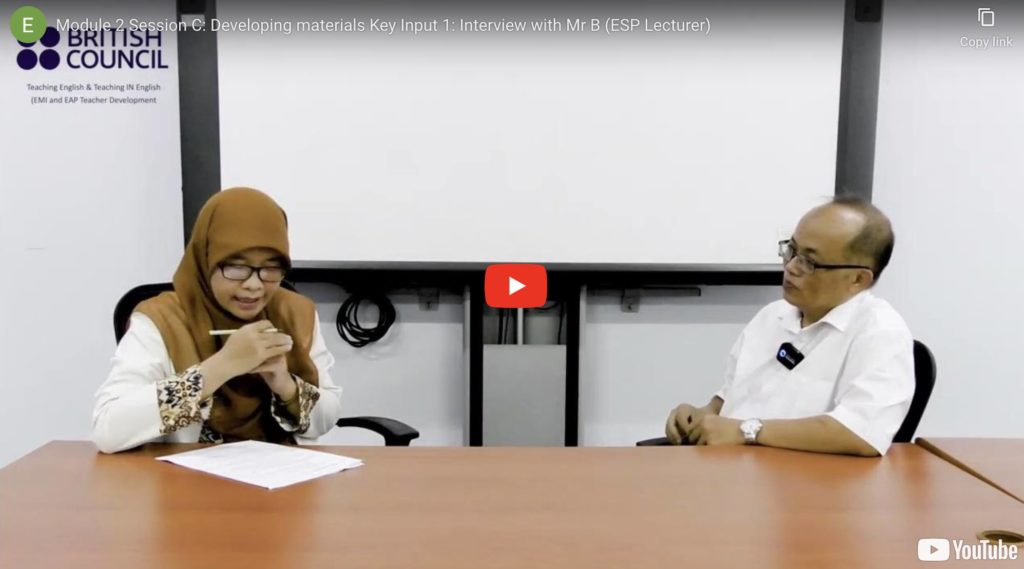
Material Design
Jump to:
Introduction
Welcome to Module 2!
In this module, we’ll seek to familiarise you with different approaches to selecting, developing, and adapting learning materials in EMI, EAP, and ESP classrooms. Teaching to mixed ability students in EMI or EAP classrooms can often be very challenging to teachers. In this module, our experts Dr Carole MacDiarmid and Dwi Kartikasari will highlight the benefits of collaboration between EMI and EAP/ESP lecturers, explore ways to improve your resource development, and introduce project-based learning (PBL) as well as methods to design materials for PBL in your classrooms.
Completing this module will help you to:
- adopt a principled approach to material development (based on needs analysis, principles of selecting and adapting materials, and balancing content and language).
- demonstrate an understanding of project-based learning.
- apply different methods to design materials for project-based learning.
Dr. Carole MacDiarmid from the University of Glasgow, the UK, a Senior Lecturer in English for Academic Study. She’s interested in academic language use and in how our understanding of linguistic features can be applied to materials design, both for EAP language learners and for EAP tutor development courses. In this session, she will:

- introduce needs analysis for EMI and EAP/ESP.
- explain the principles behind selecting and adapting materials, and discuss the relationship between materials, authenticity, and student needs
- discuss the importance of collaboration between EAP and EMI specialists and offer examples for focussing on content and language.
Ms. Dwi Kartikasari from Politeknik Negeri Polibatam, Indonesia, an Associate Professor in the Department of Business Management. In this session, she will:

- define project-based learning (PBL) and explain the rationale for adopting PBL in EMI classrooms.
- identify key resources for the development of PBL materials.
- discuss how PBL materials can help improve criticality.
You will also observe a selection of interviews with ESP and EMI lecturers that will:

- showcase real world challenges experienced during materials development.
- offer some of their methods and solutions to selecting, adopting, and adapting materials for their teaching context.
Glossary of key terms
Before continuing with the module, you may find it useful to familiarise yourself with the following key terms. We will return to these terms at the end of the module.
| Vocational-based learning | Type of learning focuses on developing skills and knowledge related to (current or future) work. |
| Project-based learning | A teaching model that emphasizes assigning tasks, particularly in the form of projects, that can lead students to experience an inquiry process Grant, 2002 in Indonesian MOE Perdirjen number 27 in 2022). |
| Needs analysis | The systematic investigation and exploration of student needs; what they need to be able to do to be successful in a specific area/task. |
| Constructive alignment | An approach to course/materials design that aims to align, i.e., link, as closely as possible the aims and intended learning outcomes (what learners should be able to do), to the teaching approach and the assessment. |
| Authenticity | If course materials and activities or tasks are authentic, they are viewed as ‘real’ or similar to the original text/purpose. Using authentic texts for EAP would mean using texts (e.g. for reading, or examples of writing) that are used in academic contexts (or very similar to those). |
| Genre | A recognisable type or category of text, e.g., speaking or writing, with a clear purpose and expectations of organisation and language use. For example an academic abstract in a scientific journal, a laboratory report, a lecture. (They can change in format and expectations over time). |
We hope you enjoy the module!
Module content
Discussion forum
Share your view and experience in the M02: Material Design discussion forum. Feel free to engage with responses from other learners.
Find the M02: Material Design topic below, or view our full Material Design discussion forum for more.
